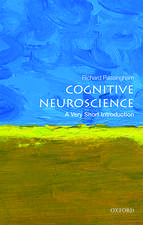Mental Representations: A dual coding approach: Oxford Psychology Series, cartea 9
Autor Allan Paivioen Limba Engleză Paperback – 13 sep 1990
Din seria Oxford Psychology Series
- 30%
 Preț: 787.68 lei
Preț: 787.68 lei - 11%
 Preț: 314.60 lei
Preț: 314.60 lei - 23%
 Preț: 330.78 lei
Preț: 330.78 lei - 34%
 Preț: 1595.08 lei
Preț: 1595.08 lei - 30%
 Preț: 590.97 lei
Preț: 590.97 lei -
 Preț: 356.82 lei
Preț: 356.82 lei - 11%
 Preț: 286.36 lei
Preț: 286.36 lei - 30%
 Preț: 1859.05 lei
Preț: 1859.05 lei - 22%
 Preț: 328.28 lei
Preț: 328.28 lei - 22%
 Preț: 485.66 lei
Preț: 485.66 lei - 47%
 Preț: 354.55 lei
Preț: 354.55 lei - 34%
 Preț: 643.07 lei
Preț: 643.07 lei - 31%
 Preț: 448.18 lei
Preț: 448.18 lei - 46%
 Preț: 464.82 lei
Preț: 464.82 lei - 30%
 Preț: 675.99 lei
Preț: 675.99 lei - 33%
 Preț: 497.94 lei
Preț: 497.94 lei -
 Preț: 341.30 lei
Preț: 341.30 lei - 50%
 Preț: 760.43 lei
Preț: 760.43 lei - 22%
 Preț: 354.88 lei
Preț: 354.88 lei - 19%
 Preț: 453.58 lei
Preț: 453.58 lei - 34%
 Preț: 802.03 lei
Preț: 802.03 lei - 27%
 Preț: 351.88 lei
Preț: 351.88 lei - 8%
 Preț: 340.84 lei
Preț: 340.84 lei - 39%
 Preț: 1218.33 lei
Preț: 1218.33 lei - 34%
 Preț: 1167.71 lei
Preț: 1167.71 lei - 34%
 Preț: 609.78 lei
Preț: 609.78 lei - 8%
 Preț: 310.81 lei
Preț: 310.81 lei - 28%
 Preț: 431.42 lei
Preț: 431.42 lei - 34%
 Preț: 1168.02 lei
Preț: 1168.02 lei - 34%
 Preț: 818.86 lei
Preț: 818.86 lei - 50%
 Preț: 520.77 lei
Preț: 520.77 lei -
 Preț: 127.27 lei
Preț: 127.27 lei -
 Preț: 282.75 lei
Preț: 282.75 lei - 24%
 Preț: 386.49 lei
Preț: 386.49 lei - 34%
 Preț: 1434.66 lei
Preț: 1434.66 lei - 27%
 Preț: 502.06 lei
Preț: 502.06 lei - 28%
 Preț: 605.94 lei
Preț: 605.94 lei - 23%
 Preț: 523.62 lei
Preț: 523.62 lei - 34%
 Preț: 762.60 lei
Preț: 762.60 lei - 28%
 Preț: 488.97 lei
Preț: 488.97 lei - 22%
 Preț: 422.01 lei
Preț: 422.01 lei - 31%
 Preț: 397.59 lei
Preț: 397.59 lei - 34%
 Preț: 599.38 lei
Preț: 599.38 lei - 16%
 Preț: 341.24 lei
Preț: 341.24 lei
Preț: 581.30 lei
Preț vechi: 790.99 lei
-27% Nou
Puncte Express: 872
Preț estimativ în valută:
111.25€ • 115.71$ • 91.84£
111.25€ • 115.71$ • 91.84£
Carte tipărită la comandă
Livrare economică 03-09 aprilie
Preluare comenzi: 021 569.72.76
Specificații
ISBN-13: 9780195066661
ISBN-10: 0195066669
Pagini: 336
Ilustrații: 9 illustrations
Dimensiuni: 226 x 154 x 21 mm
Greutate: 0.54 kg
Editura: Oxford University Press
Colecția OUP USA
Seria Oxford Psychology Series
Locul publicării:New York, United States
ISBN-10: 0195066669
Pagini: 336
Ilustrații: 9 illustrations
Dimensiuni: 226 x 154 x 21 mm
Greutate: 0.54 kg
Editura: Oxford University Press
Colecția OUP USA
Seria Oxford Psychology Series
Locul publicării:New York, United States
Recenzii
"The chapters on episodic memory, bilingualism, and image manipulation give excellent accounts of experimental results....It is difficult not to concede the book's major point: The available data demand something better than common code theories have thus far been able to provide. With a deep empirical volley, Paivio's new book places the ball firmly in the other court."--Canadian Journal of Psychology











